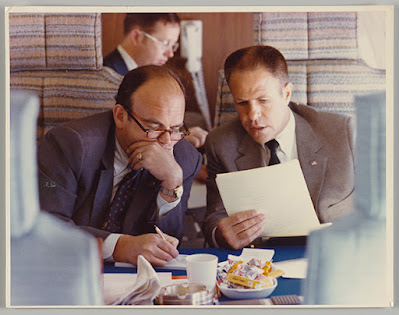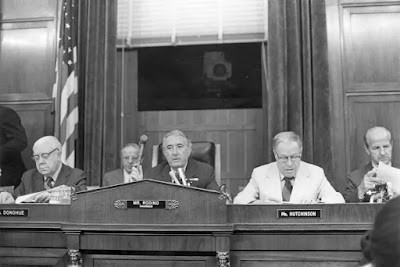It begins at the conclusion, a few dry words from Warren Burger, the Chief Justice of the U. S. Supreme Court that ended a stalemate: “The generalized assertion of privilege must yield to the demonstrated specific need for the evidence in a pending criminal trial.”
With that, the curtain rang down on what had been one of the most consequential and popular presidencies in American history. What began as a counter to New Frontier adventurism and Great Society excess ended with genuine horror as well as displays of shocked virtue that would have embarrassed Captain Renault. Like this book.
In spinning his story, Theodore H. White often leaves key details unexplained, apparently figuring readers are also in the know and just want this recent tumult explained. He is not writing a history but a sermon, complete with hellbent evildoers and brave angels.
Richard Nixon was not evil, White acknowledges, just blinded by self-righteousness and low-minded subordinates:
The single thread that runs through them, if any thread can be found at all, is the thread of non-comprehension and his assumption of his own innocence. He had not, knew he had not, been guilty of ordering the Watergate break-in; his men had done that. But it was as if his chauffeur had been caught breaking a speed limit.
This is a sort of follow-up to White’s running accounts of presidential elections, four in all, from John F. Kennedy’s in 1960 to the 1972 blowout that saw Nixon win 49 states. But it is also a muted mea culpa from White for having touted Nixon’s virtues in 1968 and 1972.
White uses this book as an opportunity to examine how Nixon came to power, from the extremist, referendum-based politics of post-war California to suburbia fearing radicalism and change:
Middle America had been without a great leader for generations, and in Richard Nixon it had elevated a man of talent and ability, a President so powerful as to change the world, so powerful that Richard Nixon alone had been able to destroy Richard Nixon.
As long as White focuses on the internal forces around Nixon, his paranoic quirks and compulsion for receiving and giving loyalty, he is on safe ground. But when he calls out pals in the Democratic Party and the press for their selfish heroism in bringing Nixon down, the hypocrisy gets rather pungent. As a President, Nixon was a moral failure, but exposing Tricky Dick’s bunker mentality only tells half the story.
As a culmination of the “Making Of The President” series, Breach Of Faith is a disappointment. Much of this is by design, as White wrote it wanting to communicate uncertainty and dispiritedness in the wake of Nixon’s unprecedented resignation from office in August 1974.
But there is also a sense of what a contemporary New York Times review described as a shattered faith in the democratic process, that after so many Presidencies where flawed men were ennobled by high office, there could be such a catastrophic failure as Nixon. I know, huh?
In fairness, White doesn’t pretend Nixon’s immediate predecessor, Lyndon Johnson, wasn’t more a master of dirty tricks, and more venial in his corruption besides. It was just that Nixon, as John F. Kennedy once confided, had “no class;” not when it came to how to lie or when:
A successful politician must, inescapably, be something of a hypocrite, promising all to all, knowing that, if elected, he must inevitably sacrifice the interests of some for others. But a man in government must know when to choose trust and faith over political need. If exposure of his acts threatens to contradict his words, he must renounce his acts and keep his word, because the people must trust his words at whatever cost – or he cannot govern.
There is nothing wrong with White’s opinion piece except that it interrupted a flow of very fine campaign histories, replacing the you-are-there narrative of the “Making Of” books with White observing the flow of recent news and expostulating at length about what it all means.
White did have good sources in the White House, Nixon loyalists like Leonard Garment and Alexander Haig who candidly present their versions of events, which align with White’s take. Garment, a liberal attorney and longtime Nixon friend, would blame a “negative synergism” brought both by Nixon’s reflection of the hostility he felt around him and the stoking of this persecution complex by chief aides.
Most aides shared Nixon’s sense of injury to some degree. Where too many of them went wrong was in trying to outdo each other in their indiscriminate zeal to respond to the flak their boss was getting.
John Ehrlichman, Nixon’s chief advisor for domestic affairs, approved the illegal break-in of a psychiatrist’s office to uncover embarrassing secrets about an opponent. John Dean urged the President bribe one of the Watergate burglars, Howard Hunt, for his silence.
The Watergate break-in itself seemed more a macho escapade on the part of a shady ex-FBI agent, G. Gordon Liddy, than any clear plan. Apparently breaking into Democratic National Committee headquarters on the eve of their party’s convention was supposed to uncover something unseemly Nixon could have used against his opponent.
White questions how this might have worked: If not insane, the mission was wildly extravagant and useless. If any evidence had turned up, it would have been, as any Justice Department lawyer might have told them, tainted evidence invalid in court.
Nixon did put up with an unprecedented level of criticism and even sabotage compared to his Democratic predecessors, but White sees the overreactions of Nixon and those around him as post hoc justification. They should have developed a more stoic view, like their predecessors.
It is a romantic, naïve view when considered today:
From their long adventure in politics, they had developed an unspoken code – the concept of control, the belief that events can be, must be, managed. What they had not learned is the essential difference between the roughhouse code of political management and the majestic responsibilities that must attend the management of a government.
White admits that Democratic presidents misbehaved in office. They just were less bound by ideological imperatives and had a better sense of their nation’s greater good in the end.
White operated from this idea in other books, most notably The Making Of The President 1960, where the Kennedy staff is portrayed as a conclave of unparalleled excellence and youthful vigor. Usually, though, White allowed for some amount of back-and-forth between the many sides, which gave his books more heft and intrigue. Even when Goldwater got blown out in 1964, his out-there views get a hearing.
The best any of the Nixon men can do, in reacting to a tape recording of Nixon entertaining a bribe attempt, is to claim the guy simply wanted to protect an underling and hadn’t thought through the consequences. Credible, perhaps, but hardly exculpatory.
The White blow-by-blow approach simply doesn’t work as well here as with the campaign histories, where the narrative lens can move from one set of players to another, taking in different aspects of a larger campaign and relying less on authorial commentary. Comparing it to All The President’s Men, the Bob Woodward-Carl Bernstein account of the same scandal, shows the advantage of working in short bursts and revealing key details one at a time. Breach Of Faith’s sacerdotal tone is windy in contrast, always calling out the larger stakes at play.
Was Watergate in the end just some third-rate burglary blown up by an antagonistic press and an unfriendly Congress? I believe it was more, only I felt less convinced with White pushing this point so stridently as he did. He keeps invoking the Constitution as if there had never been a greater threat to its existence, which doesn’t jibe with the record.
Nixon was simply the latest in a series of chief executives whose commitment to civil liberties waxed or waned depending on circumstances. He was an able leader, but his skill in foreign policy was countered by a gambler’s instinct that didn’t serve him well. Holding on to audio tapes that revealed his wrongdoing was a gamble; so was hiring a liberal special prosecutor. Both failed spectacularly.
Elliot Richardson, the Attorney General who resigned rather than fire that prosecutor when Nixon demanded it, summed up his former boss to White this way: “The President was never able to overcome the psychology that got him where he was and conditioned him. His use of football analogies was so revealing – anything was OK except what the referee sees and blows the whistle on.”
It is a great insight, and White offers others from people who stayed close to Nixon to the end. All express that same mixture of disgust and wonderment, very in tune with the overall tenor of the book. People in power behaved badly, fortunately other powerful people stopped them, now let us hope the nation learned its lesson.
“The true crime of Richard Nixon was simple,” White writes in conclusion. “He destroyed the myth that binds America together, and for this he was driven from power.”
It
may well be a myth, but White still wanted to express some faith in its truth,
enough to write this turgid, empty spiel about American exceptionalism and
liberal virtue instead of a balanced historical account. The result is too
often both tedious and unconvincing.








No comments:
Post a Comment